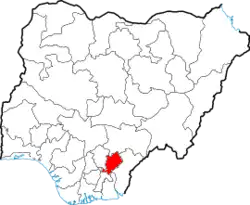
Ntezi
Eteji-Ogba | |
|---|---|
Town | |
| Ntezi | |
 Ntezi | |
| Country | |
| Area code | 480012 |
Ntezi is located in the eastern outskirt of Ishielu LGA of Ebonyi State in Nigeria.[1] Ntezi is pronounced Eh-teh-ji (Eteji) by the natives, and belongs to the Orring, Oring or Orri People. The dialect of Ntezi is K'eteji with the attached 'k' prefix given the name Keteji, a sub-language of korring spoken by Orring people in their diverse dialects across their settlements in Nigeria and Cameroon.[2] Ntezi is an Orring sub-ethnic group.[3] The Orring people occupy a scattered heterogeneous territories coexisting in three states in three geopolitical zones in Nigeria which are Benue, Cross River and Ebonyi States. Orring people are the aboriginal Abakaliki people settling in the town of Ntezi-Aba living alongside their Mbembe and Ekoi neighbours prior to the coming of the later Abakaliki group.[4] The Orring people are proxy to their neighbours, and this proximity has over the years, led to some intergroup relationship through marriage, beliefs and cultural exchanges resulting to creation of a mixed civilizations that resulted to the number of differences among the aborigines. This is the case of linguistic and cultural evidence among people.[5]
Location
Ntezi is located in eastern part of Ishielu LGA, in Ebonyi state, Nigeria. The present settlements of Orring People of Ebonyi State are: Ntezi and Okpoto as found in Ishielu LGA, Effium in Ohaukwu, and Amuda and Okpomoro in the southern part of Ohaukwu,[6] Ntezi is bordered in the north by Ngbo people, southwest by Okpoto people (an Orring community), northwest by Ezillo people, northeast by Ezzamgbo people, and southeast by Ezza people and Amuda people (an Orring community).[7]
Villages
Ntezi has five Oring speaking villages namely: Agaga, Ulepa, Iyokpa, Amata and Biledeba. These villages are further made up of various hamlets, lineages called Lèmá and farm settlements; there are also two villages of Umuezeka and Umuezekoha settlements at the outskirts to the southwest and Southeast of Ntezi respectively.[8]
Prior to Colonialism, to Nigeria Civil War, down to the present period, the Orring people of Ebonyi state simply identify with their counterparts as Igbo, bearing Igbo names and terms, cultural values, linguistic connectivity, and other identity factors. Orring to the average Orring person simply refer themselves as Igbo, and strongly maintain Igbiod personality across anywhere they found themselves.[9]
Language
The language of Orring people is Korring which is further group dialectically according individual communities and clans of the Orring people.
According A.E. Afigbo and A.I. Alagoa in Obaro Ikeme's "Groundwork of Nigerian History",[10] K'orring is classified understand the Benue Congo language family. While Greenberg classified K'orring language family as part of the Bantoid languages of the Cross River and Benue Congo language family which Igbo language forms a part.[11] This claim was further backup by the writings of Nnamdi, a historian from the department of History and International Relations in Ebonyi State University; and Offorka from the department of Linguistics in University of Nigerian Nsukka that came up with a concise agreement stating some fact and semantic relationship of Korring language and Bantu. Chief discovery of this assumption centers on the language similarities with the Bantoid "Kwararafa empire" which stretched from the Benue river far to the Cameron mountain. For instance, Bantu means 'the people'. This is the root of the Korring word for people called 'banuo (gbanuo)' and the Kukelle word ballot. Such similarities support the works of Greenberg in classification of Cross-River languages.[12]
The Kins of Ntezi in Ebonyi are Okpoto (Lame) in Ishielu LGA, Amuda (Idzem) and Okpomoro (Okpolo) in Ezza North LGA, and Effium (Uffium) in Ohaukwu LGA. Ntezi also have kins in Benue State, which are the Ogbia, Ufia and Utonkon; and in Cross River State are the Ukele, Wanikom, Wanikom, Izekwe, Wanikade, Akunakwina, among others. The Ukele speak a Korring dialect called Kukele (k'ukele), while Ufia of Benue speaks Kufia (k'ufia), K'idzem for Amuda natively called 'Idzem', and Kuffium for the Effium natively called 'Uffium'.[13]
References
- ↑ "Lee obodo Ntezi kwenyere na ha bụ Igbo mana ha anaghị asụ Igbo". BBC News Ìgbò (in Igbo). 2021-08-11. Retrieved 2023-06-10.
- ↑ Ajifo, Nnamdi. "Intergroup relationship of Ntezi and her neighbours". Nigerian Journal of History (Oral tradition and Archival documents): 225 – via AHN, project topic.
- ↑ Aleke, Patrick (2012). Idzem (Amuda) People (in English, Igbo, and Korring). Enugu. pp. 2–11.
{{cite book}}: CS1 maint: location missing publisher (link) CS1 maint: unrecognized language (link) - ↑ Nkamigbo, L. C. (2012). "Lexicostratigraphy: Tracing Geographical Location and Linguistic Change in Koring". A New Journal of African Studies. 9: . doi:10.4314/og.v9i1.6. ISSN 1597-474X: 116–126. doi:10.4314/og.v9i1.6 – via OGIRISI.
- ↑ Project, Joshua. "Orri, Oring in Nigeria". joshuaproject.net. Retrieved 2021-06-14.
- ↑ "Ntezi Archives". The Guardian Nigeria News - Nigeria and World News. Retrieved 2021-06-15.
- ↑ "pamphlet-no-date". Human Rights Documents online. doi:10.1163/2210-7975_hrd-1260-0001. Retrieved 2021-06-15.
- ↑ "pamphlet-no-date". Human Rights Documents online. doi:10.1163/2210-7975_hrd-1260-0001. Retrieved 2021-06-19.
- ↑ "Lee obodo Ntezi kwenyere na ha bụ Igbo mana ha anaghị asụ Igbo". BBC News Ìgbò (in Igbo). 2021-08-11. Retrieved 2023-06-10.
- ↑ "African Books Collective: Groundwork of Nigerian History". www.africanbookscollective.com. Retrieved 2021-06-14.
- ↑ Greenberg, Joseph H. (1972). "Linguistic Evidence Regarding Bantu Origins". The Journal of African History. 13 (2): 189–216. doi:10.1017/S0021853700011427. ISSN 0021-8537. JSTOR 180851. S2CID 162665988.
- ↑ Greenberg, Joseph H. (April 1972). "Linguistic evidence regarding Bantu origins". The Journal of African History. 13 (2): 189–216. doi:10.1017/s0021853700011427. ISSN 0021-8537. S2CID 162665988.
- ↑ Project, Joshua. "Orri, Oring in Nigeria". joshuaproject.net. Retrieved 2021-06-14.
- "Ntezi Archives". The Guardian Nigeria News - Nigeria and World News. Retrieved 2021-06-09.